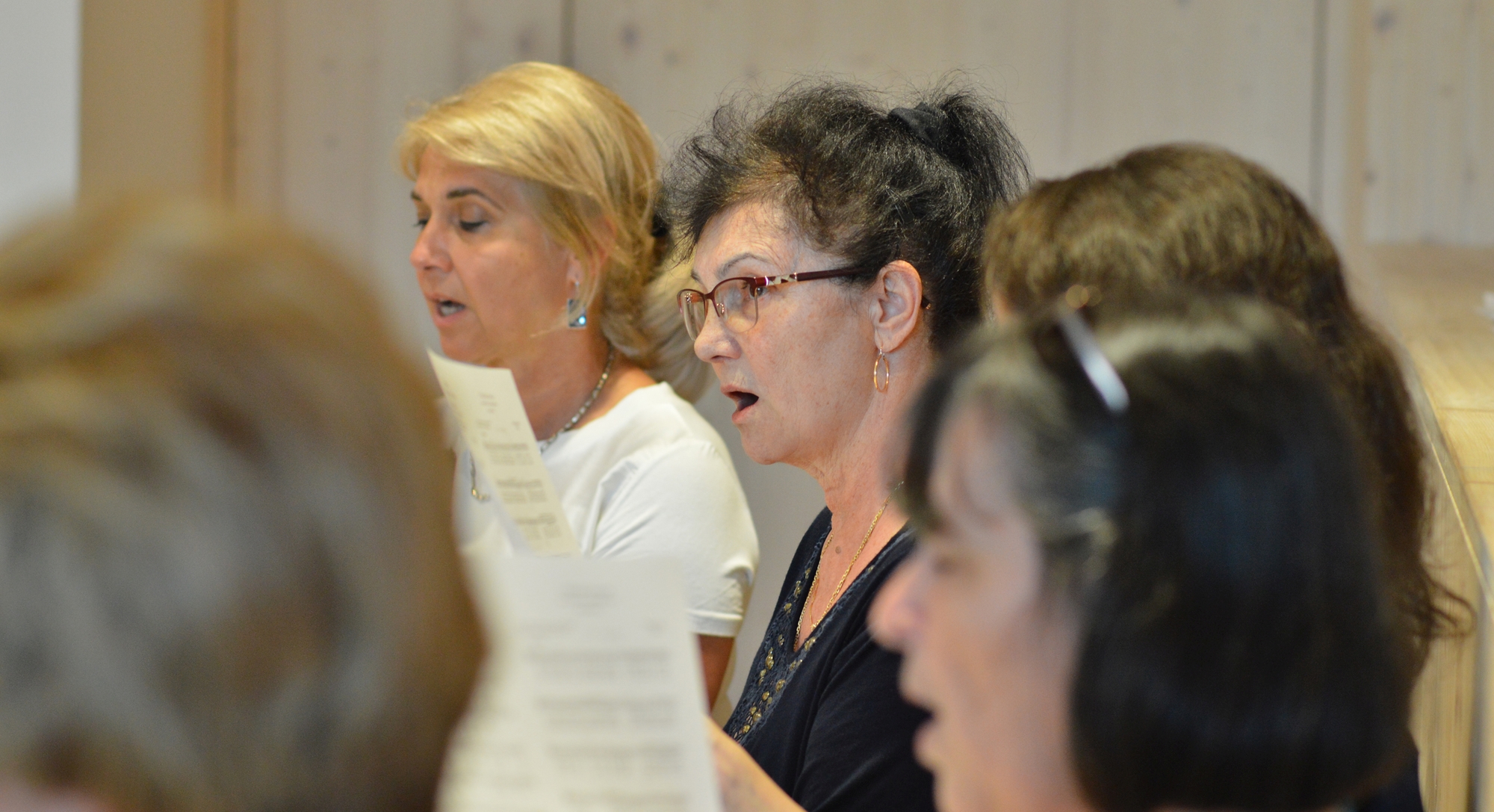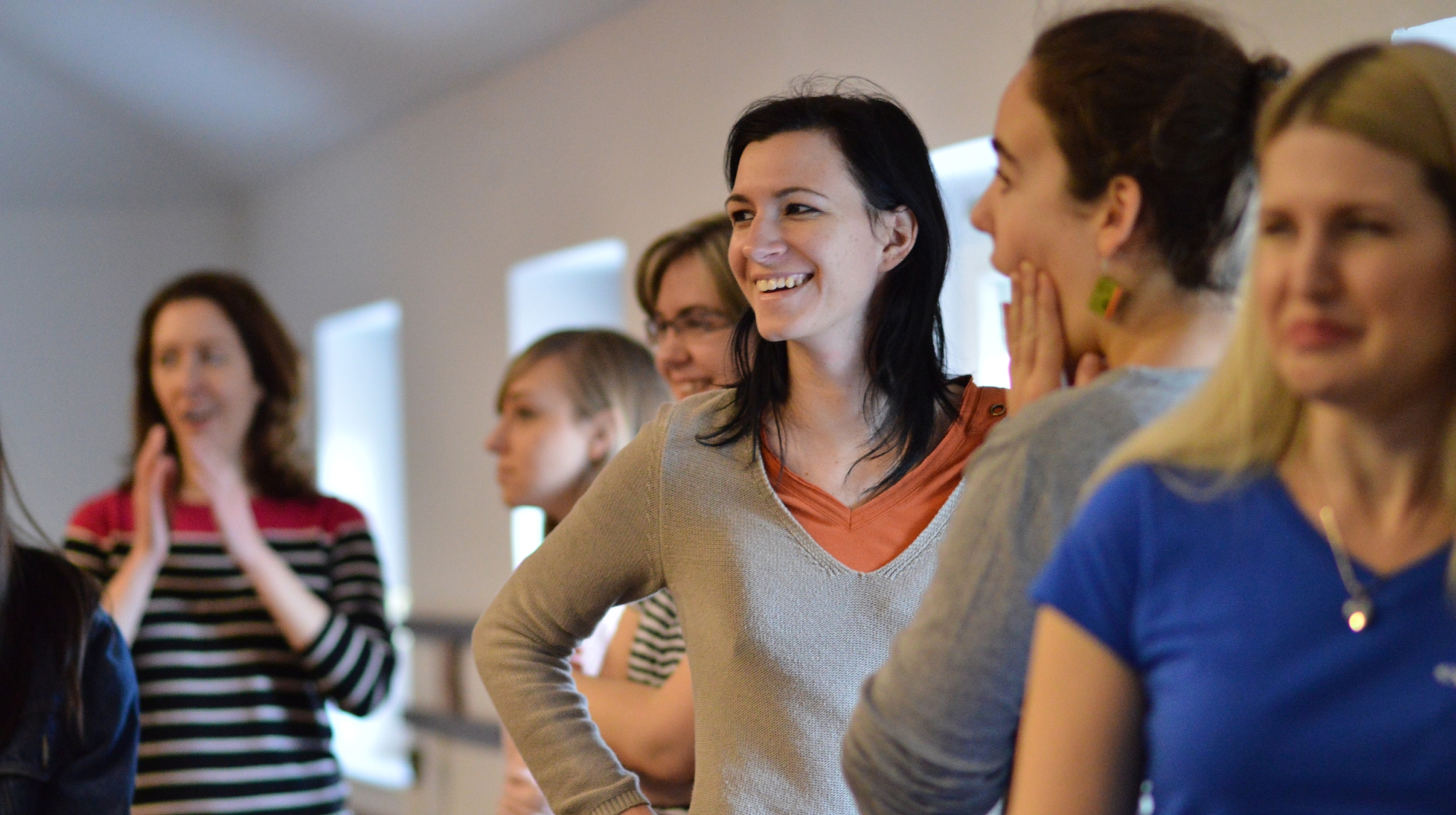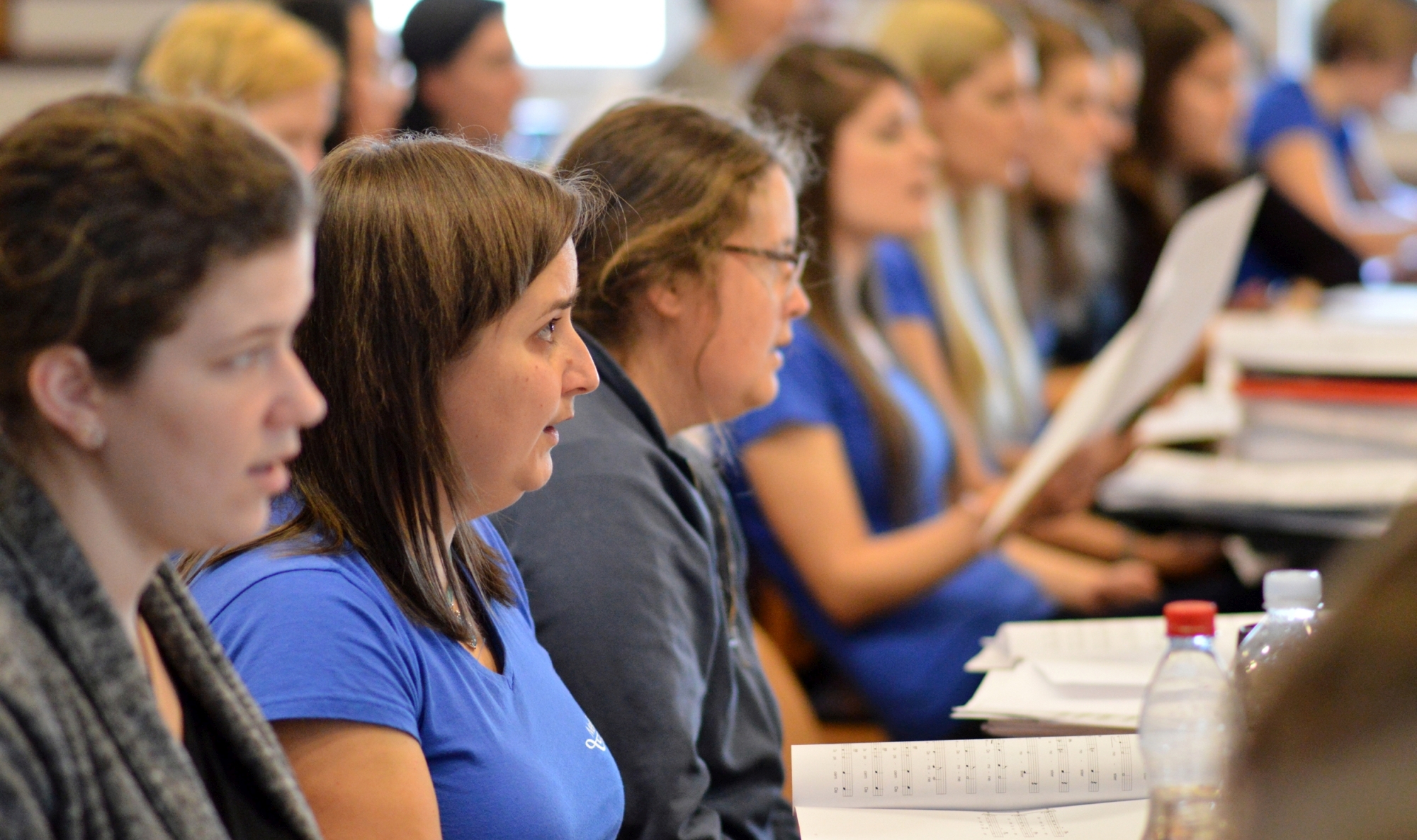
2019. 10 8. | blog, ChoralVocalTraining, korushangkepzes
[vc_row css=”.vc_custom_1570540866050{padding-top: 60px !important;}”][vc_column][vc_single_image image=”4272″][/vc_column][/vc_row][vc_row][vc_column][vc_column_text]
Why choir vocal training?
[/vc_column_text][vc_column_text]Written by Csaba Tőri
8 October 2019[/vc_column_text][vc_column_text]I remember, it was a big task to find the right name. In retrospect, it is surprising how many things the name wants to refer to – and how many things it is trying to draw attention to.
We received many comments in the first few weeks: “Such a thing does not exist,” “Who are they who think that a choir should sing differently?”, “If it’s only for choirs, then it’s not right for the individual who wants to learn to sing,” etc. I started thinking about it.
At first, I began to believe it, because practicably the human voice is one and indivisible, its characteristics are given – one cannot really distinguish methods in this.
The confirmation
What finally convinced me the most was when a few of our students completed the 10-week-training and indicated that they would be happy to continue. We had to think about the direction we should develop them further.
Perhaps the most important thing is that we believe in it: everyone will learn as much as they like. It is an illusion that because the teacher’s motivating them, you’ll reach a higher level then you’ve expected.
That is why we offer 10-week courses – ending with a meaningful conclusion: we have discussed, practiced together, the tools that will guide us in the long run – in most cases, they prevent the development of bad inclusions or help to overcome the inconveniences.
Never must!
The basic principle of all ImPulse programs is that we want to overcome even the appearance of obligation. Simply because it kills motivation. It does not take months or years, a few hours are enough: what you have to do is instantly discouraged, while looking at the same thing as an option – where you get to decide to do it or not – gives you a much greater sense of accomplishment.
However, since our training lacks the formality of what we need to do officially, we somehow want to make sure that there is a purpose in our learning, for what we work together.[/vc_column_text][vc_column_text css=”.vc_custom_1578309001097{margin-top: 40px !important;margin-bottom: 40px !important;margin-left: 30px !important;border-left-width: 3px !important;padding-left: 30px !important;border-left-color: #fe4c3f !important;border-left-style: solid !important;}”]There is a famous experiment in which researchers went to some elementary schools to see what decides which child will be a successful, great person. To do this, they completed a test with each of the children and took the tests for evaluation. When they returned the told the results to the teachers and who are the kids to pay attention to more – because they will become great people.
What’s interesting about the experiment, though, is that they didn’t even look at the tests, they randomly selected the kids and named them as the best of the class – which included presumably better and worse students.
A few years later, in the second phase of the experiment, they looked at how much the “promising” and “less promising” children had changed from the previous visit. Perhaps unsurprisingly, it turned out that children, who were looked at as kids with a great future and many opportunities, outnumbered the development of the “others.”
We didn’t know exactly how different their upbringing was, but one thing was certain: the ones who were trusted by the teachers developed much faster than the ones who weren’t. However, the test itself had no influence on what to think of its filler.[/vc_column_text][vc_column_text]The role of the goal
One of the most important tools of pedagogy is positive suggestion. If we set a goal together and communicate to the student that we believe in the goal, then he / she will believe in it.
If there is no common goal, only the desire to sing, the result is much slower. (Just think, what if we didn’t tell the GPS where we wanted to go, just to go. How much less of a chance would be of us returning home?)
It’s long a difficult for sure
By precisely defining your goal and breaking it down into small steps, you can achieve much less time to reach each level. Many people think that it takes a long time – or a lot of work – to learn to sing.
Of course, to some extent this is also true: climbing also requires time. At the same time, not everyone desires the heights of the Mount Everest, personally I climb Mount-John the most. When it comes to singing techniques, everyone expects that if one learns to sing, he / she will do it “normally” until he / she becomes a “normal” singer.
There are two problems with this: many do not have the courage to start, and if they start, when they necessarily quit (since not everyone can be a singer, it’d be terrible), the initial goal is often not achieved yet, so the person is disappointed. And what was once one of the most off-putting, enthusiastic goals of the person’s life was no longer such an experience.
Being an amateur is liberating
We have many concerts behind us, many students in the choir who’ve had great experiences and given to others. The trick is simply that there was a goal that motivated us and then, after reaching that goal, we left with satisfaction: it was worth doing it. No one would have thought that 3 men who did little or nothing of classical singing before, could sing the famous sculpture scene of Don Giovanni. But they wanted to, and so they learned – certainly not perfect, but with a long applause.
So, as an amateur you don’t have to meet professional standards individually – yet the performance can be amazingly high. On one hand, because the credibility and the intention will come through the performance and on the other hand, because a well-set goal can be achieved in the foreseeable future.
What is less, what is more?
It matters a lot to know how the thinking of a non- professional person works. We don’t talk about a lot of singing issues, but there are ways to bring them along – bypass.[/vc_column_text][vc_column_text css=”.vc_custom_1578309159599{margin-top: 40px !important;margin-bottom: 40px !important;margin-left: 30px !important;border-left-width: 3px !important;padding-left: 30px !important;border-left-color: #fe4c3f !important;border-left-style: solid !important;}”]Singing is, after all, a business where much depends on imagination. Mostly because we use a lot of muscles that cannot be moved voluntarily – they can be triggered by imagination, emotion, or other voluntary muscles.[/vc_column_text][vc_column_text]Many times, one of these 10-week-courses is enough to pass on a lot of knowledge and create initial success experiences. Practicing is the decision of the individual: finding a new purpose, looking for a music community where the person can develop his/herself, practicing individually – whatever the person really likes.
Can someone be a soloist?
Experience has shown that up to 60% of those who have studied with us have been able to play solo roles with certainty. Most of the time, the audience was impressed, and they returned home with sincere satisfaction.
Of course, it takes more than a few years to get someone to the Hungarian State Opera House: a few years and better and better teachers who know that part of the journey.
However, anyone who wants to get started, or has had experience for several years, and is considering taking the topic seriously, we are happy to help and give you two more bonus points: we’ll help you discuss the purpose of the first period, and then give you a place in your life where you can come back anytime for help – or even where you can enjoy the next few years. Even if you are not perfect right away :)
Take it into consideration what we can do to help – you can find a solution here:
For those with quick questions
For those with long-term vision[/vc_column_text][/vc_column][/vc_row]

2019. 01 30. | choirsinging, ChoralVocalTraining, korushangkepzes
[vc_row css=”.vc_custom_1564905195567{padding-top: 60px !important;}”][vc_column][vc_single_image image=”4143″][/vc_column][/vc_row][vc_row][vc_column][vc_column_text]
Vocal Technics form a Materialistic Angle
[/vc_column_text][vc_column_text]Written by Csaba Tőri
30 January 2019[/vc_column_text][vc_column_text]Getting weaker a butterfly – is said – could less and less fly, its wings get collapsed more and more. And after hours/days of waiting for passing away, in a minute it soars high as long time before, and as it lands it takes its final breath.
Allegedly most humans pass away after getting better all of a sudden. As if they would show once again what really is hidden in them.
Several music pieces are composed the same way: slowing, fading, calming down, and by the end flying high again: a big crescendo, a strong dominant and it ends.
This pattern could be detected in many areas: we humans are like this, we see it in the animal world, and we even find it in music.
„Everything is energy, this is all what you should know.
Tune yourself on the frequency of the Reality you want to live on and you will get it. It can not be other way. This is not philosophy. This is physics.”
One can read these – not always relevant – kind of quotations in esoteric notes. I lifted up my head when I learned that these words were those of Einstein. So a man who happened to be one of the highest peaks of materialistic thinkers, greatest minds described these words over those I can discuss truly with friends knowledgeable in sciences. :)
For many years I had thought there was no depth behind material. There was nothing behind things, once we would understand why things are like they are, as all relations can be learnt and proved. But then there was no reason to play music: if everything is logical and explainable, someone should please help to understand why I get depressed by one precise and accurate performance of Beethoven’s 9th Symphony and catch fire by another one that is almost the same by the music notes. Still there must be a substantial difference.
I still feel likely that most of the things could be described by exact calculations but for a long time I have been observing when materialistic and spiritual approaches are conform. Learning the world is sensational and I feel it becomes apparent more and more that different approaches get to the same point.
Eventually singing consist of the same mechanisms as life. Energy, unexplainable self confidence are key factors in whether two line H will sound or fall. Just as we have been developing by learning reading and writing or as we learn our qualities, whether we bear hot spices or not, we are following the same route when training to sing. We need to know when starting where we are and where we want to get. In order to see what we have to develop – and after smaller successes, filled up with self confidence to cope with bigger tasks.
And our biggest help is energy and common wish: as we motivate and inspire also each other that it could be and will be better the obstacles will outweigh.
Immediately I fell less that „I do not have a voice, it is better for everybody not to hear this”. But Steve is standing beside me, who also does not have.
Not yet.
But till it will come, it is good to invest energy together.
This is what Choral Vocal Training is about. We do believe that one does not have to face all time at the beginning what one does not know. When starting, we set goals together and collect good practices so as to get more spirit and knowledge what one can base higher goals on when stepping forward.
ImPulzus would like to help here, and that is why we developed weekly Choral Vocal Trainings or intensive weekend workshops.[/vc_column_text][/vc_column][/vc_row]

2018. 11 3. | choirsinging, ChoralVocalTraining, korushangkepzes
[vc_row css=”.vc_custom_1541271792877{padding-top: 60px !important;}”][vc_column][vc_single_image image=”7274″][/vc_column][/vc_row][vc_row][vc_column][vc_column_text]
How different is a vocal training of a choir?
[/vc_column_text][vc_column_text]Written by: Csaba Tőri
October 27, 2018[/vc_column_text][vc_column_text]In one word: a lot :)
When you found an amateur choir, you do not dream of building up a choir from well-educated singers. Of course, if it works well, there will be often choir members, who will feel ambition for more self-improving, but as a conductor you should expect that the “spine” of the choir will always be those who are engaged for the community, but do not consider themselves as professional musicians.
So that if someone would like to be a soloist, it usually happens that a choir will not too big motivation for them, moreover a lot of times they should give up the vocal training principles that are evident for them, because there is no other tool that help to assimilate into the common sounding.
A well-trained singer would solve any kind of situation naturally.
Sometimes it happens that after a couple of years of vocal training, they emerge from the community that launch their improvement; later the private lessons are cancelled, but they have no time to reconnect – so playing music will temporarily will disappear from their life.
Our aim is double, when we teach vocal trainings for choirs: on one hand we would like to have everyone to sing healthy without pain (since I wrote it first, I have realized how common this problem is); on the other hand we would like that everyone could do this in a way that the community they belong to could be around them.
We are over several concerts where we could experience that a singer’s vocal knowledge – let it be with awareness or skill-based – is essential. every play would be grateful when the singers learn not only the notes, but the technical part of it, even the whole music interpretation. Nevertheless, if somebody can do that, it is worth to step forward to the solo roles. Within our choirs we could observe that there was else that provided more improvement in self-esteem than a couple of arias or to sing a part of any musicals successfully.
Otherwise there is a difference in the technical exercises too: while a singer with professional ambition like to invest months or years in learning a technical element, an amateur singer won’t have so much time for it even they have a strong desire to do so. It needs to compromise a lot of times but establishing a kind of an illusion has extreme importance: if you believe and feel that it would be successful, it will succeed easier and later much better.
[/vc_column_text][/vc_column][/vc_row]

2018. 11 3. | choirsinging, ChoralVocalTraining, korushangkepzes
[vc_row css=”.vc_custom_1541271508472{padding-top: 60px !important;}”][vc_column][vc_single_image image=”7264″][/vc_column][/vc_row][vc_row][vc_column][vc_column_text]
Why the vocal training of each choir is different?
[/vc_column_text][vc_column_text]Written by: Csaba Tőri
October 27, 2018[/vc_column_text][vc_column_text]The answer seems to be very simple, and actually, it is simple, but it reserves so many interesting things, so it worth to have a post about it.
The reason behind of this is that each person has different voice capabilities. We are different in terms of volume, tone, pitch, and comfortable range, and our vocal strain ability and agility are important determination factors in the songs that are worth for us to sing.
As choir singers there is another aspect that is worth to focus on. When we choose a choir or a seat, on one hand it is good to pay attention to be among people with same type of voice, on the other hand to focus on technically how to sing.
Of course, an amateur choir works for the joy of singing primarily, and it has no priority to build technical know-how. Same time I could observe on my choir members that they could find their optimal neighbours, and their technical knowledge improved two-three times more within a couple of weeks. That is why it is so important, because the members within the choir started to assimilate to each other, so the conductor will also be happier, and the audience could expect more beautiful result soon. Anyway, be careful: avoid making this as a source of unnecessary tense. Some people will pay attention to this, others maybe would not be aware of this, but we also have an impact on each other by instinct. It would not be any good if this became another source of conflicts among people with different views. When we pay attention to enjoy ourselves vocally during the rehearsals too, for sure, the common experience of the choir would provide more value for us.[/vc_column_text][/vc_column][/vc_row]





Recent Comments